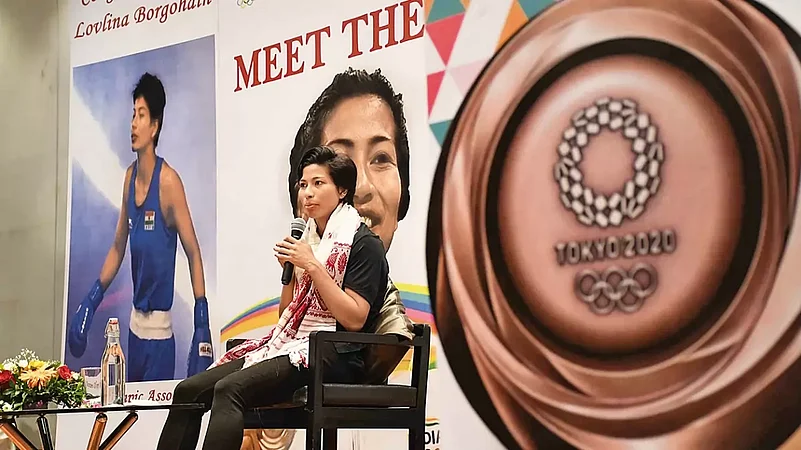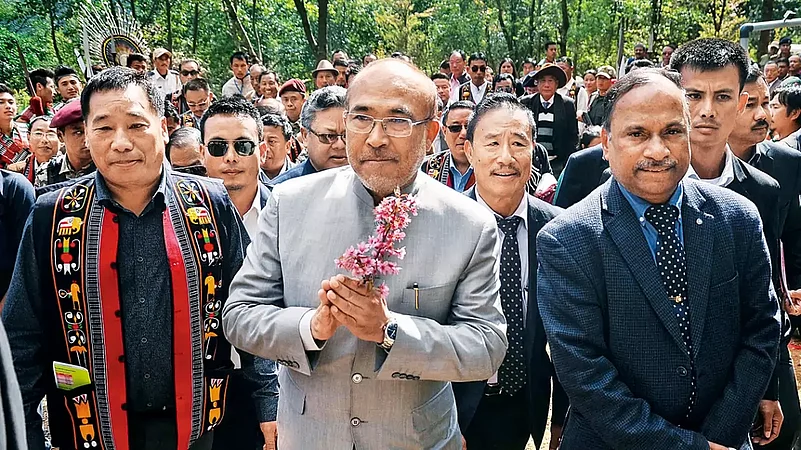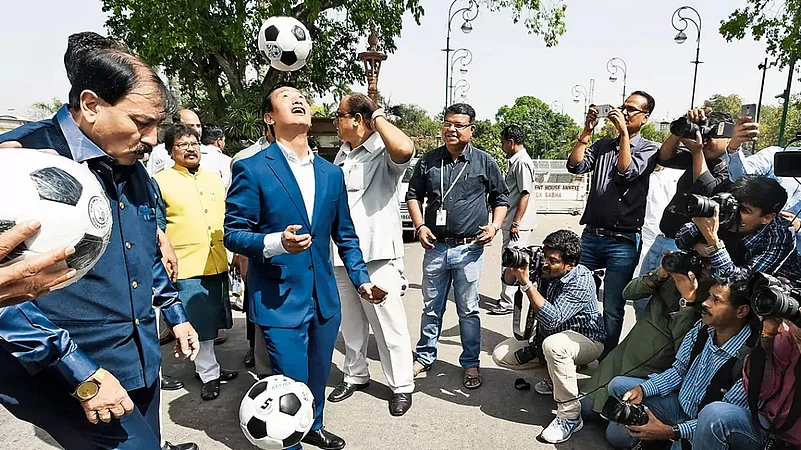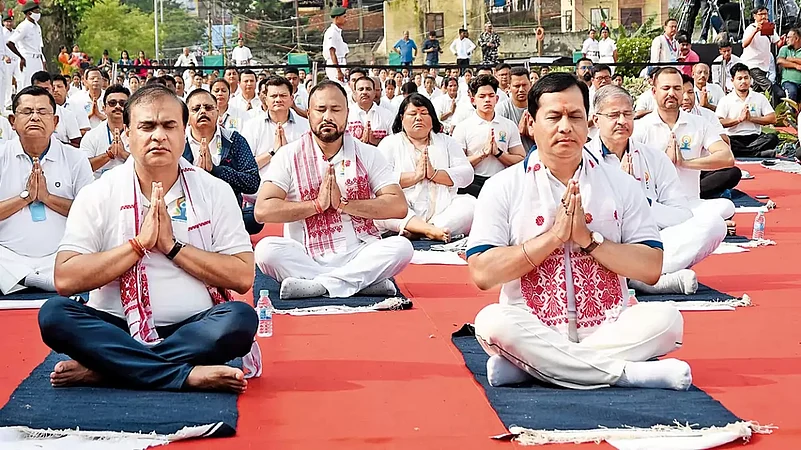When Manipur, a Northeastern state with a history of insurgency, extra-judicial killings, drug use and economic blockades, was going to the polls in February this year, the main promise of all parties in their election manifestos was the repeal of the controversial Armed Forces (Special Powers) Act in the aftermath of the Oting firing incident in Nagaland.? But the ruling BJP (then and now) did not make any such promise for which it drew sharp criticism from the opposition parties, especially the Congress. Instead, the party chose to focus on another issue about which the Manipuris are extremely passionate: sports.
BJP’s Big Sports Infrastructure Push In The Northeast
In order to woo the Seven Sisters, where millions of people are sports crazy, especially football, the Centre is trying to promote a mainland sport like cricket in the region

Games and sports have been a part of Manipur’s culture and traditions. Manipur’s identity is incomplete without sports. As a matter of fact, the famous game of polo took birth in Manipur.? The state with a population of 3 million has produced some remarkable sportspersons like MC Mary Kom, Mirabai Chanu, Bombaila Devi, Laishram Sarita Devi, Laishram Devendro Singh, Dingko Singh and Oinam Bembem, to name a few. But like any other Northeastern state, Manipur struggles with limited sports infrastructure. Well aware of the fact, the BJP promised to solve all the burning problems of the state with one solution - turning? Manipur into the sports hub of India.
The party also scored on the fact that its CM candidate, N Biren Singh, was a former footballer.
During an election campaign in February in Churachandpur, one of the districts highly affected by illegal drug use and HIV, the Home Minister, Amit Shah, said, “I take pride in the fact that the Biren Singh government has transformed Manipur onto the path of peace. (Chief Minister) Biren Singh is a former footballer; he knows how to score a goal and also defend the goal post.” On expected lines, N. Biren Singh scored the goal well and became the Chief Minister for the second time.

For Singh, perhaps the first professional sportsperson to become a Chief Minister, sports has taught him qualities essential for a politician too.
Talking to Outlook, Singh said, “As a sportsperson, I have learned discipline, teamwork, focus and maintenance of health to reach many goals. There is no surprise in sportspersons becoming political leaders. But, to be honest, I was not into sports for making a political career out of it. I joined politics because I wanted to serve my people.”
Singh, at just 21, played football for the Border Security Force (BSF) team in 1981 and won the Durand Cup. In August this year, for the first time, Imphal, the capital of Manipur, hosted the tournament where the Defence Minister, Rajnath Singh, was present.
However for Singh, focusing on sports by his government is not for gaining popularity and not just a tool to motivate youths. “For me, gaining popularity is not the priority here. Sports is already a way of life here in Manipur. What we have done is simply provide the
required infrastructure, platform and support to the people who really love sports,” he added.

In Assam, that sports could be the key to political and electoral success was grasped well by the then Congress Chief Minister, Tarun Gogoi. During his second term, Assam had hosted the 33rd National Games in Guwahati in 2007, across 16 sporting venues, most of which were newly constructed. Like the 2010 Common-wealth Games in Delhi, the 2007 National Games turned Guwahati into a city favourable for holding mega sports events.
During the frail tail of his political career and campaign for the 2016 Assembly polls, which saw the advent of the new political force, the Bharatiya Janata Party, Congress campaigners made the development of the sports infrastructure of the state a key component of the success of the government. Even when the Khelo India Youth Games were being organised? in 2020 when the BJP was in power, former CM Gogoi went on to claim in a public address? that the mega event was happening in Assam only because of the infrastructural development of the state during the Congress regime.
Before leading the BJP as state president, Sarbanand Sonowal, was the union sports minister during 2014-2016, a tenure that shaped his political career and paved the way for him to become the first BJP chief minister of Assam. During his tenure, he repeatedly
expressed his desire to make Assam the sports capital of India. Sonowal’s stint as? sports minister at the centre helped the BJP? convince a large section of youth in the state to come out to vote for the development of sports infrastructure in the state.

However, according to Prarthana Hazarika, an internationally acclaimed sports journalist from Assam, the Assam government has been making fake promises of infrastructural development in the state and many politicians are taking credit for sportspersons who are winning international sports events like the Olympics on their own steam.
Talking to Outlook, Hazarika said, “Many fake promises are being made by the government and yet the development of sports infrastructure in the state is not at all satisfactory. There are ace players who have turned their raw paddy fields into stadia where they train young people. But sportspersons need a scientific approach to be an Olympian or to reach the heights of what a Neeraj Chopra or a P. V. Sindhu has achieved. Whatever infrastructure we see today, was developed way back in 2004-2005, ahead of the National Games in 2007.”
Hazarika also lamented the fact that politicians are taking credit for athletes when they win medals in prestigious sports events on their own effort. “Many athletes, on condition of anonymity, have said that whenever they win a significant tournament, they get calls from politicians to attend decorative government programmes. Many athletes practise with empty stomachs. But the government uses them whenever they make a name. So there are times when these athletes are being used as poster girls or boys by these politicians and in return they do not get anything.”
Holding international events in Assam is not of much use to the athletes if attention was not given to the training of coaches, adequate salaries not given and reviving? sports policies is not a priority, added Hazarika.
In poll-bound Meghalaya, the Conrad Sangma-led government supported by the Bharatiya Jan-ata Party has started building 318 grassroots sports facilities across the state and iconic ones like the P.A Sangma Multisports Complex in Tura, J.N Stadium in Shillong and the Wahiajer Multisports Complex in West Jaintia Hills. About 30% of the population is in the age group of 15-29.
In the Meghalaya Assembly, one would find a number of legislators who were? ace players before joining politics. For instance, 36-year-old Eugeneson Lyngdoh, legislator from Mawphlang constituency, is a former footballer who played as a midfielder for the Indian Super League. Banteidor Lyngdoh, a minister in Sangma’s cabinet, was also a former sportsperson. Conrad Sangma, who himself is a sports enthusiast, feels that sports and politics are closely related.
Talking to Outlook, Sangma said, “Not just Meghalaya, globally there are many instances of sportspersons turning into politicians. There has always been a close association between sports and politics. Very recently, Neymar Jr has supported ex-Brazil President, Bolsonaro, despite opposition from many quarters. Imran Khan, George Weah and many others have been successful sportspersons who turned politicians. Sportspersons command huge popularity, which naturally is essential in politics.”

On being asked whether or not popularity as a sportsperson could convert into electoral gains, Sangma said, “Initially, popularity might help to score a few electoral victories. But, according to me, there are several factors critical to convert popularity into votes. Some might (sportspersons in politics) be successful and some might not, as goals and votes are different.”
Bhaichung Bhutia, the most popular football face from Northeast India, for example, has not been able to make a significant? mark in his political career. Despite his undying popularity and hero status among die-hard football fans, Bhutia, the president of Hamro Sikkim Party, has struggled so far to find his feet in local politics, unlike on a football ground.
While the rest of India is cricket-crazy, the Northeastern states worship football. After the BJPs entry into? the Northeast, efforts are being made to integrate the Northeast into mainland India’s consciousness. Among? the efforts, BJP-led or supported governments in the region are trying to promote mainland sports like cricket in the region. Nagaland, witness to one of the longest insurgencies in the country since the time of Independence, has been an outlier. Outfits like the National Socialist Council of Nagalim – Isak-Muivah (NSCN (IM)) have
demanded a separate flag and constitution, citing the unique history of the Nagas. Yet in 2016, Chief Minister of Nagaland, Neiphiu Rio, who heads the BJP-supported United Democratic Alliance (UDA) government, appealed to the Board of Control for Cricket in India (BCCI) to pay more attention to the cricket infrastructure in the state. “Cricket binds the country; it is like a religion. It integrates the country and we should be made part of it,” he said.
ALSO READ: An Enigma Called Imran Khan
(This appeared in the print edition as "Wooing the Seven Sporty Sisters")
- Previous StoryWomen's T20 WC 2024: Fatima Sana Seals Pakistan's 31-Run Victory Over Sri Lanka In Campaign Opener
- Next Story

























